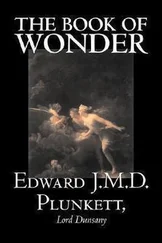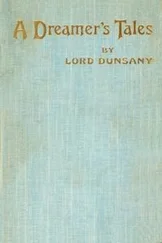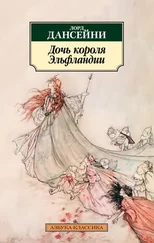KEDDLE: From this pumpkin, sir?
LARCHET: Yes.
KEDDLE: Well, well.
LARCHET: That’s what a scientist can tell you about a pumpkin.
KEDDLE: Well, I’d never have thought it.
Exit KEDDLE.
Enter MRS. LARCHET through gate .
LARCHET: I’ve just been telling Keddle something about a pumpkin.
MRS. LARCHET: Yes, I’m sure you have. And I’m quite sure you didn’t mention to him the very faintest possibility of buying one. I’m sure you didn’t tell Keddle we’d no vegetables in the house. And the reason you didn’t tell him that was that the idea never crossed your mind. And if such an idea ever had presented itself to you, you’d never have thought it mattered.
LARCHET: Why no. I never did.
MRS. LARCHET: And how often did I tell you we hadn’t a vegetable left in the house?
LARCHET: Well, I never thought of it.
MRS. LARCHET: Because you can’t think about anything nearer than the planet Neptune.
LARCHET: I wasn’t thinking of the planet Neptune at all. You don’t understand. There’s a new planet been discovered far beyond Neptune. It’s the greatest discovery that astronomers have made in our lifetime. One can’t help thinking about it sometimes.
MRS. LARCHET: Well, that’s further off still.
LARCHET: Yes, I said it was.
MRS. LARCHET: And where are we going to get vegetables from.
LARCHET: I’ll buy some.
MRS. LARCHET: Where? From the new planet?
LARCHET: No, from, from some suitable place.
MRS. LARCHET: But where?
LARCHET: Oh, I don’t know. ( Shouting. ) Keddle! Keddle!
KEDDLE’S voice is heard answering .
MRS. LARCHET: Now you know what you want him for?
LARCHET: Yes.
MRS. LARCHET: I wonder.
Exit MRS. LARCHET.
Enter KEDDLE.
LARCHET: Oh, Keddle.
KEDDLE: Yes, sir.
LARCHET: We wanted some vegetables.
KEDDLE: Did you, sir?
LARCHET: Yes. Er, how much, how much is that pumpkin?
KEDDLE: Couldn’t sell that, sir. It’s for the harvest festival.
LARCHET: But I must have vegetables. I must get something. Would a pound buy it?
KEDDLE: I hardly think as it would sir, being as it’s for the harvest festival.
LARCHET: Well, would £5 buy it?
KEDDLE: Five pounds?
LARCHET: Yes. I see it’s a large pumpkin. Would £5 buy it? You see it’s about all I have on me.
KEDDLE: Five pounds, sir?
LARCHET: Yes.
KEDDLE: Well £5 might.
LARCHET: Well, there it is; ( gives a £5 note ) and if you feel it’s enough for the pumpkin, why then you can let me have it.
KEDDLE takes the pumpkin down off his shoulder and folds up the fiver and puts it in an inner pocket and buttons up his jacket . LARCHET picks up the pumpkin .
Well, thanks very much. ( Exit to house. )
KEDDLE, who has not spoken, now expresses himself with a smile and a wink. And as the huge joke of getting a fiver for a pumpkin pervades his inner being he smiles a wider smile .
Enter ALLEN riding or dismounting from a bicycle, just having struggled to the top of a steep hill . KEDDLE is now leering right into his face .
KEDDLE: Beg your pardon, sir.
ALLEN stares .
No, it’s not me that’s dotty, sir; but a gent has just given me a fiver for a pumpkin.
ALLEN: A fiver? Good price that.
KEDDLE: He’s dotty, sir. Do you know what he wants it for?
ALLEN: Wants a pumpkin for? You eat ’em, don’t you?
KEDDLE: He doesn’t, sir. He wants it to warm the valley with for a hundred years, and run all our trains to London.
ALLEN: How?
KEDDLE: How? Something about an atom he said, sir. Been reading fairy–stories, I expect, till they’ve turned his head. And even in fairy–stories I never heard of anyone making more than a coach out of a pumpkin.
ALLEN: What’s his name?
KEDDLE: Larchet, sir.
ALLEN: Will you think me dotty too if I tell you something?
KEDDLE: You, sir? No, never. I know a healthy young gentleman by his face, when I see one. A sickly–looking gent he is, and getting old. Got more good blood in your face than he has in his whole body.
ALLEN: Well, I’ll tell you something then.
KEDDLE: And what’s that, sir?
ALLEN: He can do it.
KEDDLE: He can do it? You a London gentleman, sir?
ALLEN: Yes, a student. Science has been on the verge of it for years, and we might find it at any moment. Wouldn’t surprise me a bit. But if a man like Larchet says he can do it, he can. He isn’t dotty.
KEDDLE: Know him, sir?
ALLEN: No. But I know his name. And if he said he was going to do it he will. It’s not a bit surprising.
KEDDLE: Well, well.
ALLEN: He lectured to us once.
KEDDLE: And all out of my old pumpkin.
Exit, scratching his head.
Enter MADGET, leading a bicycle .
MADGET: You would ride up.
ALLEN: Well, I got here.
MADGET: So did I. Bit warm, aren’t you?
ALLEN: Oh, cooling off. I just heard a very interesting thing.
MADGET: What’s that?
ALLEN: They’ve found how to release the atom.
MADGET: A village yarn.
ALLEN: No. It’s Larchet.
MADGET: Larchet here?
ALLEN: Yes he lives in Kent somewhere.
MADGET: My God.
ALLEN: It’ll be pretty interesting. We’ve heard lectures about it for years. Now we’ll see it.
MADGET: Oh, the fool, the fool.
ALLEN: Who? Larchet?
MADGET: Yes, the damned half–wit. Why can’t he leave things alone?
ALLEN: It won’t do any harm, will it?
MADGET: Harm? Listen. Sit down. ( They sit. ) You’ll grant I know something of science.
ALLEN: A good two years more than I do. But then Larchet knows thirty years more.
MADGET: Now listen. I’ve studied astronomy, while you stuck to the affairs of our old earth. Consequently you’ve never seen it.
ALLEN: Never seen what?
MADGET: Never seen the effect of monkeying with the atom.
ALLEN: Have you?
MADGET: Yes, often.
ALLEN: Seen it?
MADGET: I’m pretty sure I have.
ALLEN: Well?
MADGET: Nova after nova. The centuries blaze with them. One every few years.
ALLEN: New stars you mean.
MADGET: The sudden flare up of an old one. I’ve studied those things. I’ve worked out theories, and never have I found any theory that could account for it, except one.
ALLEN: When a star goes from the tenth magnitude to the first, you mean; and then dies away again?
MADGET: Exactly. There’s never been a passing star that collided, so far as anyone ever observed. There’s never been any reason for that sudden increase of heat, that world–wide explosion, except one. My theory accounts for it. And I never knew any other even to challenge it.
ALLEN: And what is your theory?
MADGET: Monkeying with the atom.
ALLEN: The atom? But who?
MADGET: Some complacent fool there like Larchet.
ALLEN: But …
MADGET: Do you think we’re the only intelligent life in the universe? Do you think that one of the tribes on the third planet, that swings round a fourth–rate star, is the only intelligence in the Universe. Do you really, Allen?
ALLEN: Well, no. Then what’s your theory?
MADGET: Simply that life is the purpose for which the planets swim; and of course all stars have planets. At any rate that’s the nature of the only star we know. And after life has been going for so many million years it gets stale, and self–conscious, and fretful. One day it gets too clever, and that is the end. Never mind: it all starts over again.
ALLEN: But how does it end?
MADGET: Simply by being too clever. And, by every theory I’ve tested, the same way every time.
Читать дальше












